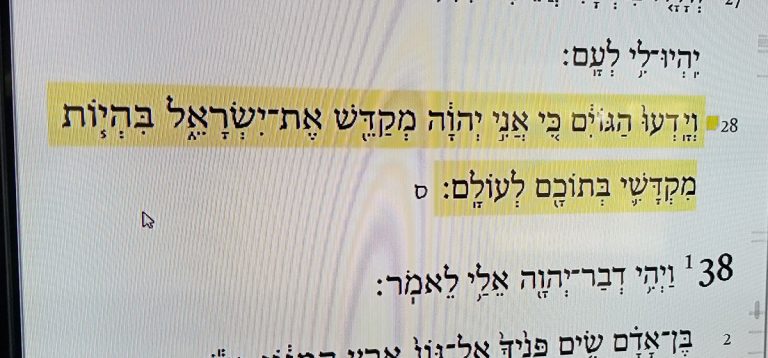Free Will and Hardening Hearts (Romans 9:14-24)
This is a follow-up to my last Wednesday night’s (November, 2018) discussion from Romans 9 at Chumuckla Community Church. The passage cited is not my suggestion of a good division of the material in Romans 9, but rather is just where we started and ended up. I did have to look back to verse 13 “Jacob I loved, but Esau I hated” to lay the foundation.
Background
Wesleyans frequently don’t spend much time preaching from these passages, I suspect because they’re not as much fun from our point of view as some other passages. But, as I try to remember and point out often, you can ignore the passage, but it’s still there. In setting the scene I would note that I have already said that I don’t think predestination and election as such, particularly as part of soteriology (study of salvation), are primarily what Paul wants to talk about. There are certainly some statements with a substantial impact on soteriology, but they come under the larger heading of “What About Israel?”
Introduction
Romans 8 ends with a powerful affirmation of God’s presence and faithfulness. Nothing can separate us from God’s love. I think that statement can be read broadly and applied both individually and in community. It does not mean that we will not have trouble, but rather that God will be faithful to be present with us through what trouble comes.
Having made that statement, Paul is left with a problem, one foreshadowed by his discussion of Jews and Gentiles in the first two (or three) chapters. If God is faithful, and if Israel was (is?) God’s child, and the bearer of the promises (Romans 9:4), how is it possible that the apparent separation is occurring with Gentiles constituting more and more of the church, and the church taking on so much of the mission? But even more, the question for Paul is why so few of his own people accept what he now affirms and proclaims, that Jesus is Messiah and Lord?
Contrary to those who see chapters 9-11 as a kind of parenthetical remark or even an insertion from some other source (a position proposed, but not broadly accepted), I see it as precisely the point to which Paul has been driving. God is a God of grace who wished to bless the entire world. God is faithful and is carrying out that mission, bring blessing to everyone. That blessing is mediated through Israel. But how can a faithful God abandon one set of people just as the blessing carried forward through them for millenia is being delivered to the rest of the world?
For Paul, this is impossible, and his message would be a failure if it were so. God cannot faithlessly abandon one group of people and expect to be viewed as faithful by another. I compared this in class to a new foster child coming to a family which then immediately kicks a previous foster child out of the house. Right after they do that, the foster parents tell the new child that they are faithful and will stick with him come what may. The second child may feel a bit uncertain of this sort of “faithfulness.”
Romans 9-11 and Anti-Semitism (An Aside)
As an aside, let me note that some of Paul’s statements have been taken as antisemitic and as justifying negative attitudes toward the Jews. This is inappropriate in a number of ways, not the least of them being God’s own commands regarding how we are to treat others. But beyond that, we should remember that Paul is a Jew, that he is here presenting how God will not abandon the Jews, and that he expresses in this the extreme gratefulness Gentiles should feel in being invited to faith in, and to receive grace from, Israel’s God. Chapter 11 makes it clear that Gentiles, having received this grace (grafting into the tree), should not boast or place themselves above the previous branches. Whatever a gentile Christian thinks about the Jews or even what Jews may think about Christian doctrine, we Christians are heavily indebted to the Jews.
Further, what a Jew in Paul’s time (thus Paul himself) can say to his fellow Jews over what was still a doctrinal dispute rather than a developed new religion cannot possibly justify racial or religious prejudiced by Christians against Jews. From a theological point of view, anti-semitism or anti-Judaism both constitute a form of sawing the limb you’re sitting on off on the trunk side. Differ in beliefs, but don’t do any looking down, much less despising.
So watch the proof-texting you do from a passage in which Paul intends to affirm God’s faithfulness to his (Paul’s) own people.
God’s Hardening
This is all as background. The question I wanted to explore further, both for those left with questions (as I would expect!), and for those who were unable to attend the class for various reasons, is the idea of God hardening Pharaoh’s heart. We started by tying this back to 9:13, which quotes Malachi 1:2-3, “Jacob I loved, but Esau I hated.”
However we translate, we have selection and rejection. I would maintain that the selection is as people of the promise, those who would carry forward the blessing promised to Abraham. This says nothing about ultimate salvation, but rather about mission. This is, of course, a mission that Paul has affirmed both in this chapter and back in chapter 3 as a blessing. So Jacob is getting a blessing for which Esau is rejected. (Genesis makes it a pretty dramatic thing!)
So now in Romans 9:17, we have the affirmation that not only did God harden Pharaoh’s heart, but he raised him up for that purpose (quoting Exodus 9:16). Note that translation can alter the full impact of that passage, but this is where we were in the class. While you can alter the full impact, you really can’t get away from the idea here that God purposefully put Pharaoh in this position in order to use him as the foil (or revelational straight man) for what he intended to do as Israel.
In Exodus, however, we have different expressions: Pharaoh’s heart was hardened (Exodus 8:19 and many others), I (God) hardened [Pharaoh’s] heart (Exodus 10:1, 11:1, etc.), and Pharaoh hardened his heart (Exodus 8:15, 8:32, etc.). Thus arises the question, “Who hardened Pharaoh’s heart? Was it God hardening it, or did Pharaoh harden his own heart?”
To which I firmly and decisively answer, “Yes!”
And to which people promptly ask, “How does that work?”
To which I answer, “We don’t know, but …”
From a Wesleyan-Arminian position, one wants to emphasize the choice. Pharaoh chose to disobey and to harden his heart. It would be nice to weaken the other affirmation. Calvinists look at it the other way. After all, if you can affirm that “[b]y the decree of God, for the manifestation of his glory, some men and angels are predestinated unto everlasting life; and others foreordained to everlasting death,” one king put in position and hardened to as to display God’s glory in putting that person in his place is relatively minor.
Let me look at some of the elements before giving my view.
Free Will
I would suggest using a search engine and find one of the many web sites that have copies of the Westminster Confession of faith in which you will find affirmation of both predestination and free will, which are somehow made to work together so that human beings are still to be held responsible, and God is also not the author of sin. This manages to affirm all the scriptural points, but doesn’t make them work together and doesn’t claim to. I’m not here trying to affirm or challenge the Westminster Confession of Faith, but I have found that relatively few Wesleyans are aware that the Confession affirms free will.
The problem with free will is that it’s not really free. Even with my belief in actual free will, a belief that’s incompatible in my view with absolute predestination or determinism, I believe that God does have responsibility for what happens in God’s universe. I’d go with Isaiah 45:7 as opposed to various confessions.
We tend to debate free will as though it was somehow absolute, that I have a full menu of choices and can choose any one of them. But in reality I have both inherited DNA and the environmental factors that have brought me to this day. My choices are limited by my background and my current environment. We should really be talking not about whether the will is totally free, which it clearly is not, but whether there is any freedom. If there is no freedom at all, we would have determinism. With cause and effect working without any real randomness, everything would be entirely predetermined. In the famous thought experiment, used in Stephen Jay Gould’s book Wonderful Life, of winding back the movie of life to a previous point, it would always proceed precisely as it did. And I mean precisely.
If one believes in God in such a universe, everything was determined from the moment of the big bang, or whatever event one sees as the beginning. One might see God interfering, but nobody else, since those in the universe would have every thought and action determined by preceding physical causes. Many people find this “extreme” position hard to accept or even imagine, but it’s a quite logical whole. In this universe, any idea of free will is an illusion, and predestination would be true, and true in its most extreme expressions.
My belief based on scripture’s affirmations about humanity, is that we do have a true creative ability, so that we can, in fact contribute to reality through our choices. This “free” will is very much constrained, however, by the reality in which we live. I am impacted by the choices of everyone who came before me, even the creatures who come earlier. So while I have a creative contribution, my free will is more a matter of wiggling than it is of profound course changes. I will respond to events around me according to my background. I can change, but it is difficult, and limited by physical, mental, and spiritual circumstances.
Sovereignty
The debate here is not about God’s sovereignty, and I find it disingenuous for people to suggest that it is. God does not become less sovereign when he decrees something, even if that decree is the creation of a person who has the power to do things that are in opposition to God’s will. Why? Because God is really sovereign. Unlike human powers he doesn’t have ego problems or an inferiority complex. He can handle decreeing that someone else will have some power within His universe.
Whatever will one has is the result of God’s decree. Whatever choice one makes is the result of God’s decree. This is why I like the Wesleyan term “prevenient grace” so much. God makes it possible for us to have a choice. We get to make that choice.
In response some will wonder how that is not a work of righteousness by which we earn God’s favor? I would respond that all of this occurs, as it must, inside God’s will. It is no more just us if we have a choice than it is just us if God decrees what the choice will be. In either case, we have precisely what God gives us and God has set the boundaries of his response. This is why, I believe, we can talk both about election, and also about choice.
Foreknowledge
One of the great issues with either view of the choice for salvation is foreknowledge. There are those who feel that God having foreknowledge means that, in effect, the decision is pre-made. It is known before I make it, so how is it possible that I make it. There are alternative ways of looking at this such as open theism or process theology. (William Lane Craig has written a good deal on this point, see Time and Eternity.)
I don’t believe we know how God relates to time, though I enjoy reading all of these options. I would like to add here that if God is outside of time, God would not see our actions as a sequence. It’s hard to get an analogy to work, but supposing I create a computer program with random events generated, at least from a perspective inside the program, which creates a complete picture in what seems to me the blink of an eye. From the internal perspective, my random number generator creates these things and the result is not known until the decision is made. From my perspective outside the program, the picture appears instantaneously (or seems to).
Now imagine, insofar as you can, that my perspective is infinitely expanded, while the program maintains its finite perspective. This would be my imagined relationship of God to the world. God sees all at once the things at appear to take much time.
As another aside, this is how I see the whole issue of soul sleep. I grew up as a Seventh-day Adventist, understanding death as a sleep until Jesus returns. Many Christians believe one goes to heaven when one dies. I view these two positions as equally viable depending on one’s perspective. To us, there is a delay. To the person who dies, there is none. They do not become infinite, but they live in infinity. So one can imagine one’s loved ones who have died looking down, because from eternity, all of the history of the universe appears as a point in time. The two views make no real difference whatsoever.
So the common Wesleyan-Arminian view that God elects or predestines the ones he knew would make the right choice would fit right in. God sees at once that which we choose over what appears to us to be a long time.
The Perspective of the Story
We also need to consider the perspective of the story. In Genesis 18 we have the story of Abraham receiving three visitors. Eventually the text (18:17) presents YHWH as the narrator, and YHWH says that he is going to go down to Sodom and see if the outcry of their evil is as justified (verse 21). This is not the perspective of foreknowledge. Yet we have to read the story in that fashion to hear Abraham’s bargaining properly.
The key here is this: In a story, a statement may have a perspective that is related to that story. In order to understand the story, one must work from the story’s perspective. There is no current theological view that I know of which would require God to go visit a city to discover what was going on there. This isn’t a matter of foreknowledge even, but just of a reasonable amount of ordinary knowledge for a deity. Yet the story will read very strangely if you don’t allow it that perspective.
Back to Pharaoh
Did God harden Pharaoh’s heart, or did Pharaoh harden his own heart? Put aside any view of foreknowledge and look at the story itself. Pharaoh is who he is. He has demonstrated this over time. God clearly knows Pharaoh. Unless God is to choose to either free his people by some sort of physical transportation miracle, or to do it at some other time, Pharaoh will have to be pressured to let them go. The story teller does not imagine God magically transporting people, so that’s not really on our menu of options. God has clearly decided to liberate God’s people, so that option is left out. Not impossible, but excluded by God’s plan and will.
So God, knowing that Pharaoh is not one to bend to this kind of pressure nonetheless puts that pressure on Pharaoh. God knows that pressure on Pharaoh will result in Pharaoh’s heart being hardened. So God hardens Pharaoh’s heart by proceeding with God’s plans, while Pharaoh hardens his own heart in accordance with Pharaoh’s nature.
Conclusion
We can still discuss the fairness of all of this. I don’t think this answers all questions. Why doesn’t God care enough about Pharaoh to reorder the plan in order to make it more possible for him to make a better choice? I don’t know. I make the assumption that God knows, but I don’t even have a proposed solution to that other than my expectation that God works things out.
At this point, however, I can read Romans 9 with a view both of election and of free will. I could be wrong. The scriptures do not make the relationship clear. But this is how I read it.


